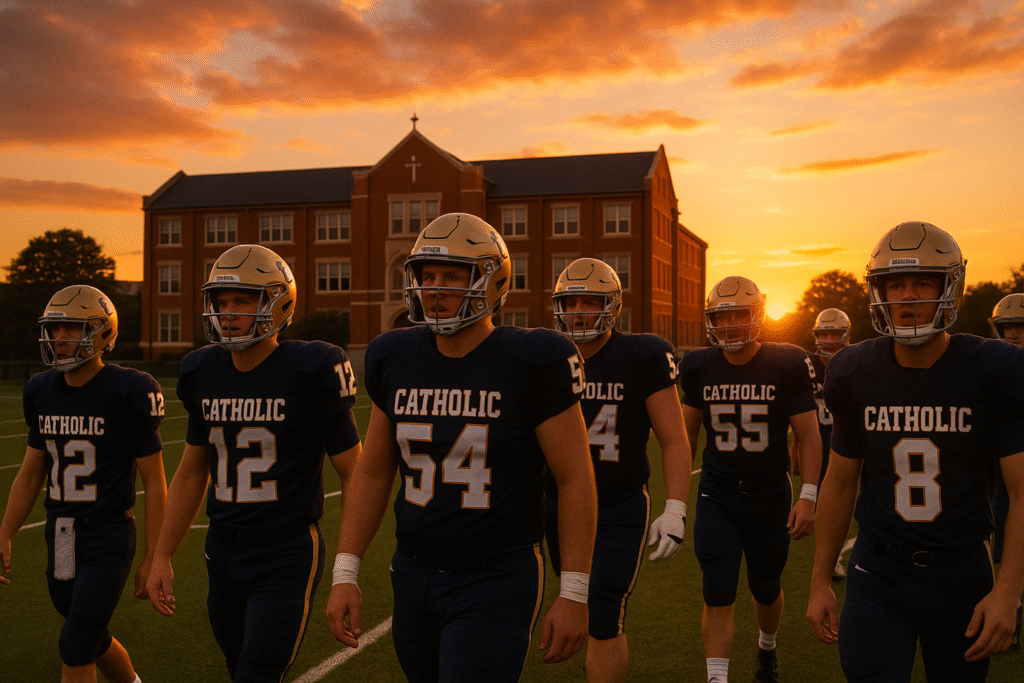Introduction to Catholic High Football
Catholic high football has carved out a unique and respected identity within the American sports landscape. More than just touchdowns and trophies, Catholic high school football programs are known for instilling discipline, character, and a strong sense of community. Whether it’s Friday night lights or Saturday morning practices, these programs are a blend of tradition, athleticism, and faith-based education.
A Legacy Rooted in Faith and Competition
The Role of Faith in Catholic Football
What sets Catholic high football apart is the fusion of spirituality and sport. Student-athletes are taught to value integrity, humility, and service — core tenets of Catholic education. Players pray before games, reflect on their performances, and are encouraged to support each other both as teammates and as brothers in Christ.
Historical Success and Reputation
Many Catholic high schools across the U.S. boast impressive football records. Schools like St. Thomas Aquinas (FL), Mater Dei (CA), De La Salle (CA), and Don Bosco Prep (NJ) are national powerhouses that consistently rank among the top in high school football. Their alumni often go on to play at top Division I colleges and even in the NFL.
Academics and Athletics Go Hand-in-Hand
Balancing Books and Ball
One of the hallmarks of Catholic high football is the balance between academics and athletics. These schools prioritize education while building elite sports programs. Athletes are held to high academic standards and often receive support in the form of tutoring, study halls, and mentorship.
Character Development
Football at Catholic schools is more than just a game. Coaches act as mentors who help shape responsible young men. The emphasis on values like respect, leadership, and perseverance prepares players for life beyond the gridiron.
Inside the Program: What Makes Catholic High Football Unique?
Coaching Philosophy
Most Catholic football coaches come with not just a playbook, but a moral compass. They use football as a platform to teach real-life lessons. Many programs operate under the “coach as educator” model, where coaching staff plays a direct role in a student’s spiritual and academic life.
Rigorous Training and Facilities
Don’t let the private-school label fool you. Catholic high schools often have state-of-the-art athletic facilities, rigorous strength and conditioning programs, and professional-level coaching. Many invest heavily in equipment, film study rooms, and nutrition programs.
Big Games and Rivalries
Local and National Recognition
Catholic high schools often schedule tough opponents, including public school powerhouses and other parochial institutions. These games draw huge crowds and are often televised or streamed nationally.
Legendary Rivalries
Rivalries like Jesuit vs. Holy Cross in Louisiana or St. Xavier vs. Trinity in Kentucky have become traditions that unite entire communities. These games are more than football — they’re cultural events.
Success Stories: Catholic High Alumni in the NFL
Many NFL stars got their start in Catholic high football programs. Here are a few notable examples:
Matt Ryan – Boston College and Atlanta Falcons, graduate of William Penn Charter (a Catholic school).
Jaylon Smith – Notre Dame and Dallas Cowboys, alum of Bishop Luers High School.
Amari Cooper – Wide receiver from St. Thomas Aquinas High School.
Their success is a testament to the effectiveness of Catholic high football in preparing athletes for the next level.
The Recruiting Advantage
College Exposure
Catholic schools often have strong ties with college scouts and programs. Thanks to national rankings and showcase events, Catholic high football players receive significant exposure to college coaches.
College Preparatory Environment
Since many Catholic high schools are also college prep schools, students receive academic guidance and support that enhances their recruitment profiles. SAT/ACT prep, personal mentorship, and faith-based leadership opportunities add to a student-athlete’s résumé.
Community and Parent Involvement
Family and Faith First
Catholic football programs thrive on family involvement. Parents volunteer, fundraise, and support the teams in meaningful ways. Faith-based events, such as team Masses and spiritual retreats, involve the entire school community.
Lifelong Bonds
The friendships and brotherhood developed in Catholic high football often last a lifetime. Alumni return to support current players, creating a legacy that spans generations.
Challenges and Criticism
Cost and Accessibility
Tuition can be a barrier for some families. However, many Catholic schools offer scholarships, need-based aid, and athletic grants to ensure talented students can attend regardless of financial status.
Competitive Pressure
With national rankings and media coverage comes pressure. Athletes are expected to perform not only on the field but in the classroom and within their communities. Balancing these expectations is part of what makes Catholic high football so intense—and rewarding.
Final Thoughts
Catholic high football represents more than athletic competition. It’s a deeply rooted tradition of excellence, discipline, and faith. These programs produce not only elite athletes but responsible, respectful, and well-rounded individuals. Whether you’re a fan, a parent, or a young athlete, there’s no denying the powerful impact of Catholic high football.
FAQs
1. Do Catholic high schools offer football scholarships?
Many offer need-based aid and athletic scholarships, especially to promising football players.
2. Can non-Catholics play for Catholic high football teams?
Yes, most Catholic schools welcome students of all faiths while encouraging shared values and respect.
3. What makes Catholic high football different from public school football?
The integration of faith, character-building, and smaller class sizes often gives Catholic programs a more holistic approach.
4. Are Catholic football programs competitive at the national level?
Absolutely. Some of the best high school football teams in the country are Catholic schools.
5. How can I get my child noticed by recruiters?
Joining a well-known Catholic football program can improve visibility, especially if the school has a strong history of producing college athletes.

